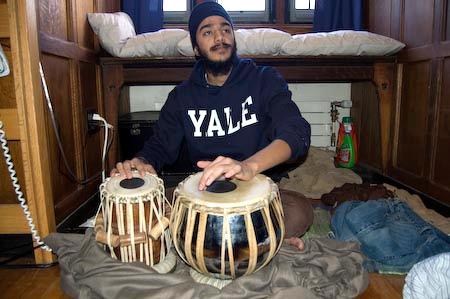 Before coming to college, Arjan Singh (Class of 2011) said his Sikh heritage permeated his life. But at Yale, he found that sense of community missing.
Before coming to college, Arjan Singh (Class of 2011) said his Sikh heritage permeated his life. But at Yale, he found that sense of community missing.
“Back home, every week on Saturdays, my family got together to meet with another Sikh family, to meditate and to sing hymns,” Arjan said. “Spirituality and religion are very rarely talked about here [at Yale].”
During the past two months, Singh and other Sikhs at Yale have come together to form the Sikh Student Society at Yale. Although the group currently has just 10 members — which is the entirety of the University’s undergraduate and graduate Sikh population — its members hope to foster a sense of community and to mitigate Sikh parents’ fears about sending their children to the Elm City.
“There’s a lot of Sikh families that don’t consider sending their kids out of state,” Arjan said. “I’m willing to bet there’s a lot of Sikh kids out there who only go to community college.”
For many Sikhs, deciding on a college depends on the presence of a Sikh community in the area, said Rajbir Singh Datta, national director of the Sikh American Legal and Defense Fund. Datta said American Sikhs fear sending their children to universities without Sikh communities because they want children to maintain their culture, language and religious beliefs. For example, Datta said, Sikh parents are less anxious about sending children to universities in California, where over half of all American Sikhs live.
“If a Sikh gets into Yale and Stanford, he’s going to go to Stanford, because Stanford has a more advanced Sikh Student Association,” Datta explained. “If at Yale, Sikhism is not seen as important, then Sikh students won’t come.”
University Chaplain Sharon Kugler said creating communities for all religious groups is essential to Yale’s goal of becoming an international university.
“Cultivating and supporting a tradition that might not be large in [numbers] is so very important if we are to be true to our vision of being a university that is truly global in scope,” said Kugler, who helped found a similar organization in her time as university chaplain at Johns Hopkins University. “I really feel strongly that Yale needs to support the creation of a Sikh Student Association.”
Kugler brought Yale’s Sikhs together for a September dinner at her house in an attempt to connect the Sikh community. “We didn’t really know about each other until Sharon reached out to us,” Singh said, explaining why the group had not formed earlier.
The group hopes to offer a place of fellowship for Sikhs at Yale, Singh said. The lack of a large Sikh community in New Haven underscores the need for a dedicated group on campus. The nearest gurdwara — a Sikh place of worship — is an hour away, in Hartford. Further, Arjan said he only knows of two Sikhs in New Haven outside the University. In short, there is no Sikh community in New Haven, Singh said.
“It’s like creating a family for Sikhs at Yale,” he explained. “It’s nice to talk with others about things that we don’t really have to explain beforehand.”
Singh said that Yale’s 10 Sikhs have met together twice in the past month to discuss what the group would do and create a constitution. The organization was supposed to finalize its constitution Oct. 23, but members were unable to meet due to conflicts with midterms.
The group has no formal plans, though Singh said he wishes to educate the wider Yale community about Sikhism, perhaps by bringing in a Sikh speaker for a Master’s Tea. The group also hopes to hold festivities for upcoming Sikh holidays.
Yale’s Sikh Society is the second of its kind in the Ivy League. Harvard University’s chaplaincy Web site lists 26 major religions the chaplains represent, but Sikhism is not one of them.
Princeton’s Dean of Religious Life, Alison Boden, said in an e-mail that although there is no Sikh group at Princeton, there are around 40 Sikhs at the university. Boden added that Princeton’s Office of Religious Life is lending support to a “Sikh student who is motivated to start such a group,” though she gave no specifics.
The only other university in the League to have a Sikh student organization is Columbia University. Columbia’s Sikh Student Association was formed in 2005 and has 18 members. In an e-mail, the Columbia group’s current president, Rajkaran Sachdej, said his group hopes to reach out to other Sikh student groups, potentially including Yale’s.
Sikhs, SALDEF’s Web site reads, follow the monotheistic teachings of 16th-century Indian prophet Guru Nanak and seek to attain God “through meditation upon and remembrance of God’s Name.” According to the organization, there are 500,000 Sikhs living in the United States, with a concentration of between 75,000 and 100,000 in the Northeast.

